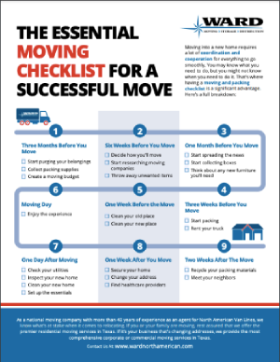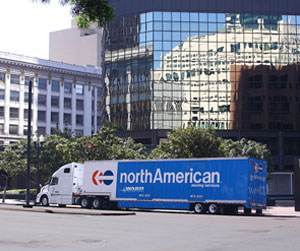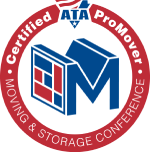
Moving into a new home requires a lot of coordination and cooperation for everything to go smoothly. Although you may know what you need to do, you might not know when you need to do it.
You don’t want to be left scrambling at the last minute to finish all of the details that can distract you from the bigger tasks such as loading the truck. On the other hand, you don’t want to do certain tasks too early and leave yourself without cable or Internet for the last few months in your current home.
Yet there’s so much that has to get done before you move that it can be difficult to know when to do it all. That’s where having a moving and packing checklist to serve as a moving timeline can be a significant advantage as you plan your move.
Here’s a more detailed breakdown:

Download your interactive or print-ready ‘Essential Moving Timeline Checklist’
Three Months Before You Move
☑ Start purging your belongings
You only want to move your most essential items, so give yourself a few months to declutter your home. Starting early will give you time to
- Sell large items, such as furniture
- Donate items to charity
- Give away items to friends or family
- Throw away broken or useless belongings
☑ Collect packing supplies
Packing your belongings will take a lot of boxes, tape, and other supplies. Collect these supplies early so you can pack efficiently when the time comes. Make sure you gather plenty of the following:
- Tape
- Bubble wrap
- Boxes
- Packing paper
☑ Create a moving budget
You don’t want to be surprised by the cost of your move so start budgeting for it now. Review your items to be moved (You can even write up an inventory), your finances, and your moving needs (i.e. Do you need someone to help you pack?). Knowing what you have to spend and what you need to spend it on will help you create a moving plan you can afford when the time comes.
Six Weeks Before
☑ Decide how you’ll move
Determine whether you’ll do everything yourself or with friends and family helping you. Or, if you’ll hire professionals to coordinate your move.
☑ Start researching moving companies
If you choose to hire professional movers, it’s a good idea to start researching them early and try to book one as soon as you can to help you stay on schedule. Check out our Top 10 Questions to ask a moving company before hiring them.
☑ Throw away unwanted items
Now’s a good time to lighten your load by selling or donating the objects you won’t be needing in your new home. Go through your belongings and put anything you don’t want to bring with you to the side to make it easier.
One Month Before
☑ Start spreading the news
A month before your move, start notifying the utilities, your bank, your insurance provider and/or anyone else who needs to know about your move. Be sure to give your new address to anyone who needs to send you important documents.
☑ Collect boxes
Anyone who has moved knows how important moving boxes are. Start collecting them about a month before your move so you’ll not only have enough, but you’ll also have enough time to pack.
☑ Think about any new furniture you’ll need
If you’re in need of new furniture at your new place, now’s a good time to start buying it and arranging for it to be delivered to your new address after you move. This can be helpful if you’re moving far away and don’t want to lug a lot of heavy furniture across the country.
Three Weeks Before
☑ Start packing
Start by packing the items you know you won’t need right away, such as any out-of-season clothing, books or collectables. Be sure to leave the essentials (toothbrush, coffeemaker, toilet paper, medications, etc.) for last. Put them all into one box so you won’t have to waste time digging them out after you arrive. Consider buying padlocks or renting safety deposit boxes or similar to keep your valuables safe.
☑ Rent your truck
If you’ve decided to move without help, three weeks before the move is when you should rent your truck, if you need one. Be sure to get quotes from multiple providers to get the best deal.
One Week Before
☑ Clean your old place
Giving your old place a thorough cleanup isn’t just considerate for the new residents — it can help ensure you don’t lose your cleaning deposit if you’re renting. If you’ve already packed most of your belongings, it will be a lot easier to clean.
☑ Clean your new place
On the other hand, it also will be easier to give your new place a complete cleaning before you move all your belongings into it. If at all possible, go to the new place before you move and make sure everything’s clean.
Moving Day
☑ Enjoy the experience
If you’ve hired professional movers, you shouldn’t have to do anything but watch them work, as long as you’ve done everything else ahead of time. If you’re handling the move yourself, you shouldn’t need to worry about anything except loading the truck, driving to your new place and unloading. Everything else should be taken care of already.
One Day After Moving
☑ Check your utilities
You aren’t going to want to skip showering or live in the dark for very long. Make sure you check the state of your utilities as soon as possible after moving in to make sure they have been turned on. If you experience any issues, take care of getting your utilities up and running before you do anything else.
☑ Inspect your new home
You have hopefully looked through your home before moving in, but now is the time to do a final check before you fill it with your things. Look for any potential issues, such as cracks, leaks, drips, or damage. If there is anything that requires immediate attention, tend to that issue before a home full of belongings makes it more difficult to take care of the matter.
☑ Clean your new home
This is your chance to give your new place a deep cleaning before furniture and other items get in the way. Starting out in a fresh, clean home will make the entire process of unpacking and settling in more pleasant.
☑ Set up the essentials
Unpacking will take time, but start with the most important items, including the essentials box you should have packed and brought with you. Other important items you may want to unpack or set up that first day include the following:
- Arrange large furniture
- Set up and make beds
- Install appliances
- Unpack your kitchen items
One Week After
☑ Secure your home
Make sure your new home is secure with new locks on the doors, fire extinguishers on every floor, and working smoke and carbon monoxide detectors.
☑ Change your address
Hopefully, you alerted everyone important to your change in address. However, shortly after you complete your move, you will need to make sure essential entities, such as credit card companies, healthcare providers, friends, and family, have your new address. You will also need to update your address for things such as your voter registration and vehicle registration.
☑ Find healthcare providers
Unless you are moving locally, you will need new healthcare providers. Take time to locate new providers such as the following:
- Emergency room and hospital
- Dentist
- Primary care physician
- Eye doctor
- Specialists
- Therapists
Two Weeks After
☑ Recycle your packing materials
Once you have the bulk of your unpacking finished, take time to recycle your packing materials so they don’t clutter up your new home. Give them away to people who are moving, put them out with the recycling, or take them to a local recycling center.
☑ Meet your neighbors
Now is the time to start settling into your neighborhood. Take the time to introduce yourself to your neighbors, sign up for local classes, join a community group or social media network, and start forging relationships that will make your new place feel like home.
Moving into a new home is a big project, but as long as you break it down into smaller tasks and schedule them appropriately, it should be manageable. If you’re preparing to relocate in the near future, be sure to follow this moving timeline checklist for a less stressful move.
Frequently asked questions
How much should I tip movers?
As a common practice, consider tipping 15% to 20% of the total moving cost. Paying in cash is usually appreciated. Although tipping isn’t mandatory, keep in mind that most movers earn slightly above minimum wage and they work hard to move your belongings safely. If possible, it’s nice to tip each mover individually.
Can I ride to my new home with the movers?
Unfortunately, due to liability issues, most moving companies are not allowed to transport clients in their vehicles. It would be best if you made separate travel arrangements to reach your new home.
How far in advance should I schedule my move?
Ideally, you should start looking for a moving company about three months prior to your planned move. This approach will help you secure the best prices and availability of services.
What if I haven’t finished packing by moving day?
It’s essential to complete packing before the moving day to avoid any unnecessary stress and delays. If you aren’t able to finish packing on time, get in touch with your moving company. They may be able to provide packing services, but this could come at an additional cost. Plan your packing schedule ahead of time to avoid such a situation.
How long does it typically take a moving company to move a 3-bedroom home?
The amount of time it takes to move a 3-bedroom home can vary. It typically takes approximately 6-10 hours depending on various factors like the amount of furniture, distance between the old and new house, availability and efficiency of the movers.
Can movers move things in inclement weather?
Movers indeed work even in rainy or snowy conditions. However, there might be certain restrictions, delays or safety concerns depending on the severity of the weather conditions on the day of the move.
What’s the best day of the week to move?
Statistically, less busy days like weekdays (midweek) can often be cheaper and hassle free for moving compared to weekends, end-of-the-month, and holiday periods when demand for movers is typically high.
How can I make my move easier and more efficient?
Strategic planning and organization can significantly reduce the stress of moving. This includes: purging unnecessary items before the move, starting to pack well in advance, categorizing and labelling the boxes, and preparing an ‘essentials’ box for the first few days at the new house.
What should I do to ensure the safety of my valuables during the move?
Make sure to inform your moving professional about your valuable items. These items should be properly packed and might require extra insurance coverage.
Do I need insurance for my move?
Yes, while all moving companies provide a basic cover, it is recommended to consider full-value protection which provides coverage based on the current market replacement value of the item. It is always better to be prepared for unexpected accidents.
What should I do if my moving plan changes?
Contact your moving company as soon as possible when your plans change. Depending on the circumstances, changing your moving date could potentially incur fees.
Last updated: Sep 16th, 2023.





